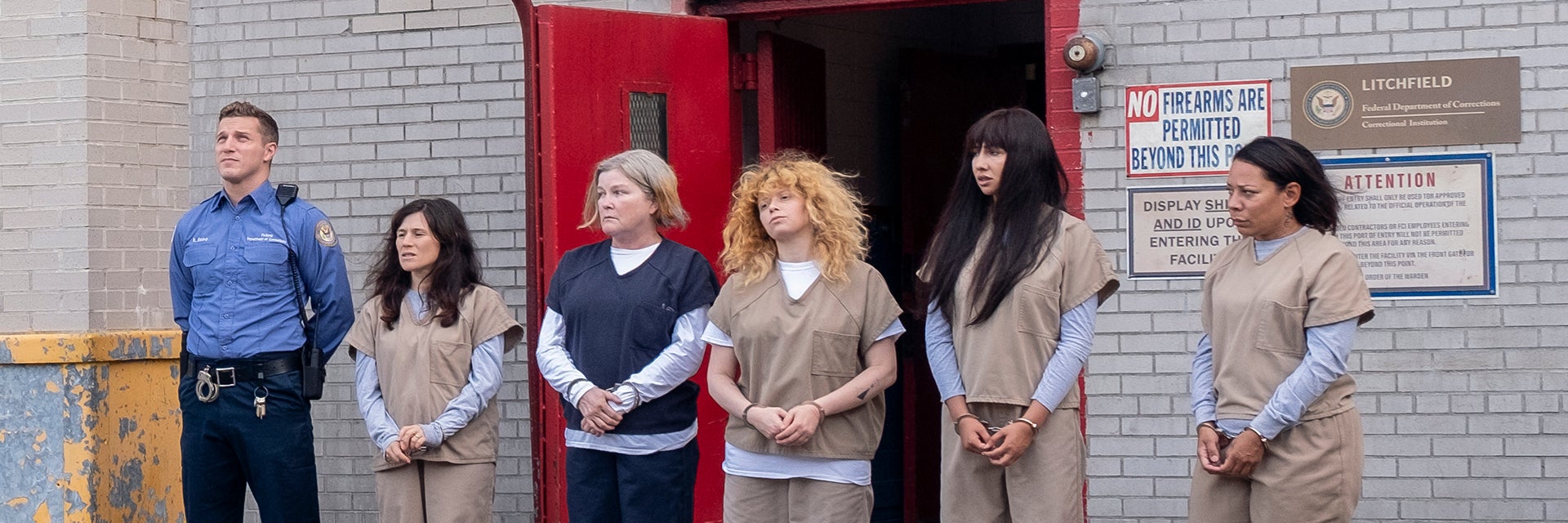On Friday, Netflix’s hit series, Orange is the New Black will come to an end after seven seasons.
The series, which initially told the story of Piper Chapman (Taylor Schilling), a young woman sentenced to prison after transporting drug money to an ex-girlfriend decades ago, soon saw its focus shift to tell a broader story.
Created by Jenji Kohan, the series explored topics of systemic racism, inequality, and prison reform. It also ushered in a new era of representation.
Not only were we seeing more Black and brown women on screen, we were seeing various ethnicities, body types, and ages.
ESSENCE spoke to three of the show’s stars—Selenis Leyva, Danielle Brooks, and Adrienne C. Moore—about the show’s impact, their character’s stories, what comes next, and more.
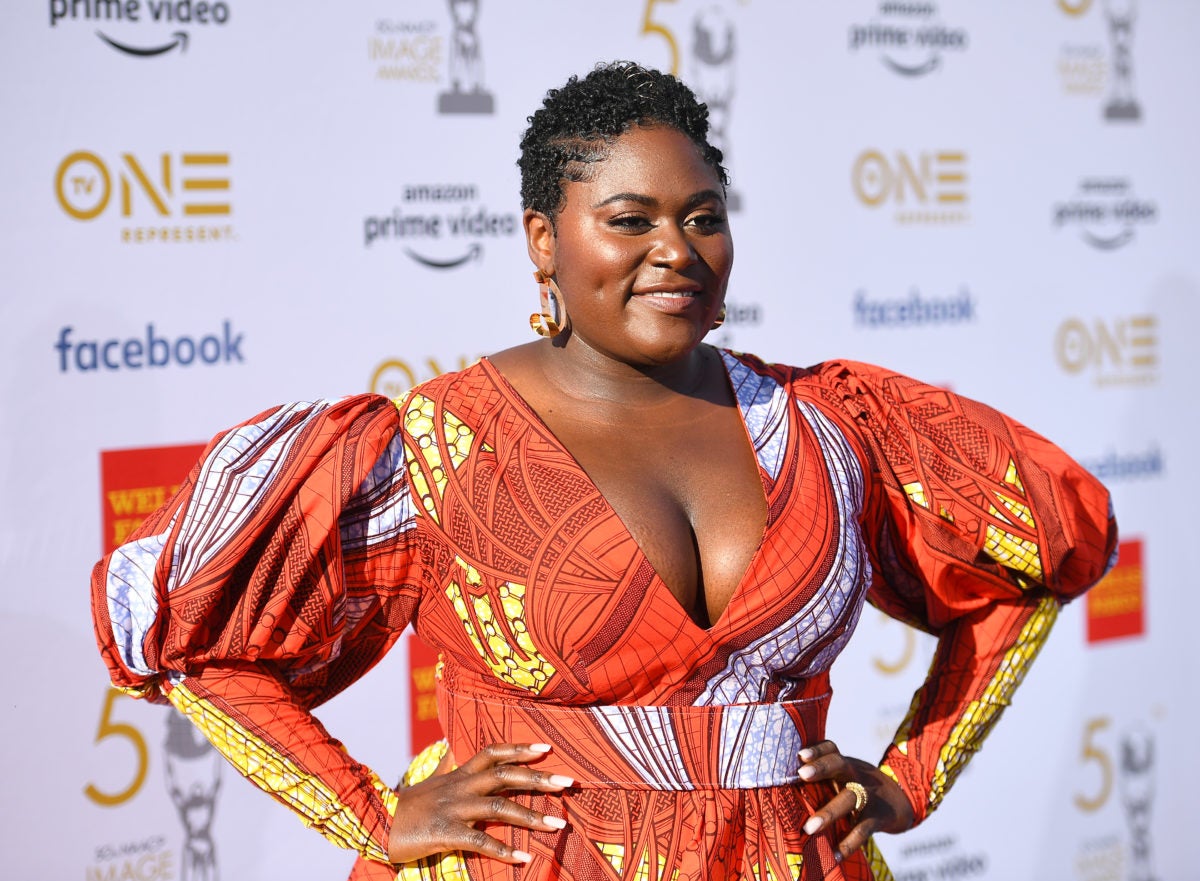
Danielle Brooks
Brooks brought to life one of the series’ most beloved characters, Tasha ‘Taystee’ Jefferson. First introduced as Litchfield Penitentiary’s comic relief, Taystee soon became a complex character fighting for the rights of inmates following the death of her best friend Poussey Washington (Samira Wiley).
Season six sees Taystee moved to Litchfield Max, along with many of the other inmates at Litchfield Penitentiary, after a riot turns into a hostage situation that leaves a corrections officer, Desmond “Desi” Piscatella (Brad William Henke), dead. It’s Taystee who takes the fall for Piscatella’s death and the riot before the season ends with her being found guilty during a quick trial, handcuffed, and sent back to Litchfield Max.
On Taystee’s growth throughout the series and where things pick up in season seven:
“Taystee is not in a good place. Unfortunately, every season the cards that she has been dealt are just becoming worse and worse and worse. I think Taystee is really trying to fight for her relationships, the people that she loves. [From] fighting Vee (season two’s villain and Taystee’s adopted mother played by Lorraine Toussaint), to the crusade, to fighting for prison reform and starting a whole riot, now we are going to really see her try and fight for herself. I think it’s going to be a roller coaster. It is not going to be pretty at all. We’ve seen enough moments of her really pushing through with hope and faith and trying to continue to find a reason to live. I think she is on her final straw. It’s going to make for an interesting season. The audience is going to be left holding their breath for a while with Taystee.”
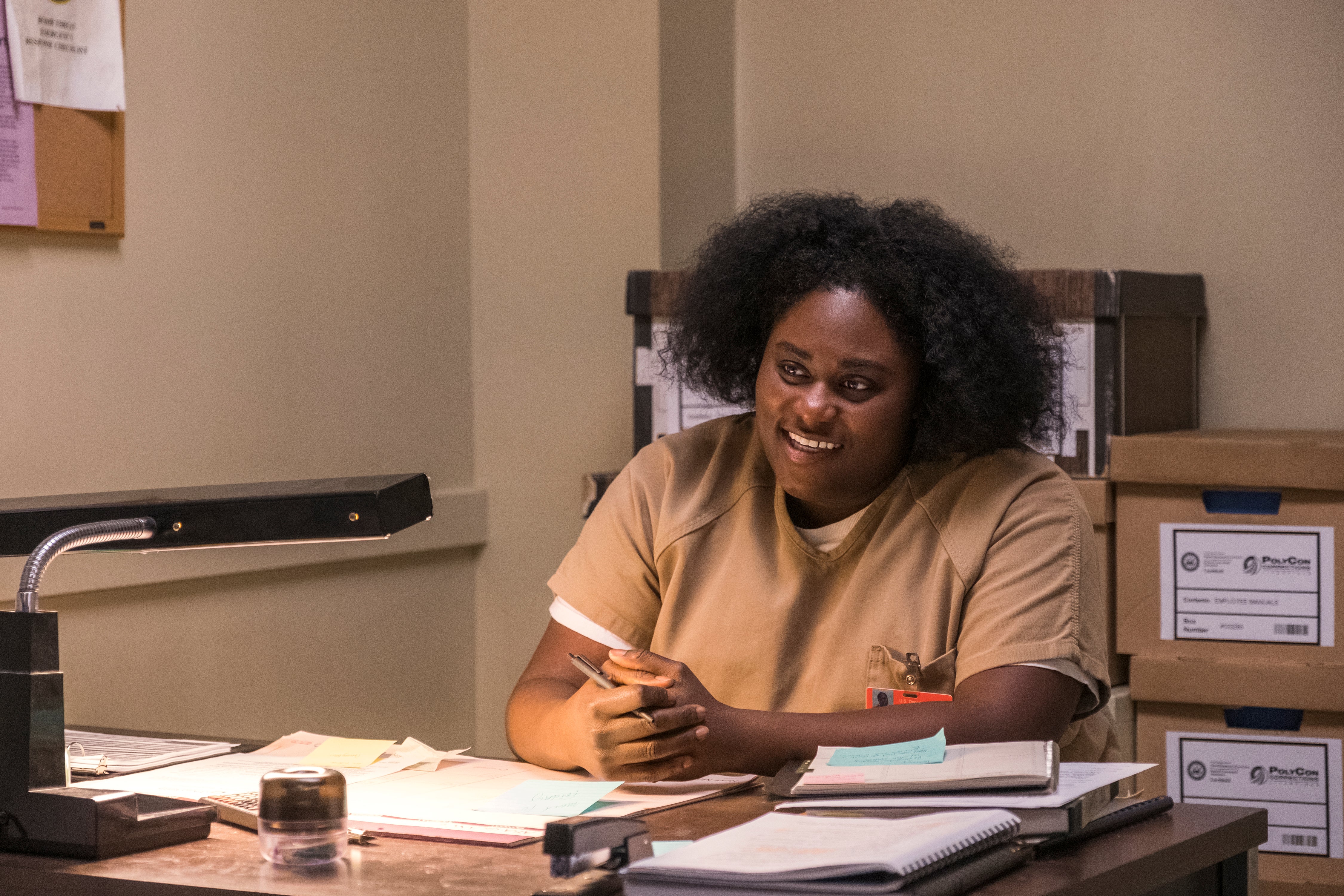
On bringing Taystee to life and watching her grow:
“I am really proud of my character. There have definitely been moments throughout the series that I have been frustrated with her choices but at the end of the day, I know that she’s really trying to do her best with her given circumstances. It’s just very unfortunate, just the hand she’s been dealt. It’s been a pleasure to get to maneuver in this character and discover what keeps her going when she really doesn’t have much to hold on to.”
On the sisterhood of the series and the show’s representation:
“How cool is it to be on a show when you know you don’t have to be the only one? That’s been such an eye-opener for me. I first came into this industry thinking that any show that I am on I am going to either have to fight for that position or I’m going to be the only one and here we are on a show where we’ve had multiple women of color be series regulars. All of us get more than 15 minutes to shine. Even when we did the ESSENCE cover, I remember being so proud. We weren’t having to collect….it wasn’t a cover of collecting all of the black women from five different shows that are the top five black women working in five shows, it was all from one show. It all came from one show, that is not considered a black show. It’s considered a universal piece of work. A piece of television. To be a part of that has also reminded me that’s what to come, and that is what is right now, present. We are seeing that throughout other television shows.”
“It’s really been quite the experience to know that we can all not hold onto that stereotype of what people think women are supposed to be working together. That we’re catty, and we’re sassy, and we’re divas and we can’t along and we can’t share the spotlight. This show has proven otherwise. It really has been a sisterhood. One that I am definitely without a doubt going to miss. But now it is awesome to see each other blossom with other projects. Seeing Samira [Wiley] win an Emmy, Uzo [Aduba] taking off with Mrs. America, Adrienne [Moore] doing theater again, how we just all support each other. I just know that the precedent that we started with our show, sharing that with outlets, sharing that with the world, sharing that in interviews and that coming from a real honest place, it’s going to show women in these other shows that’s what is possible.”
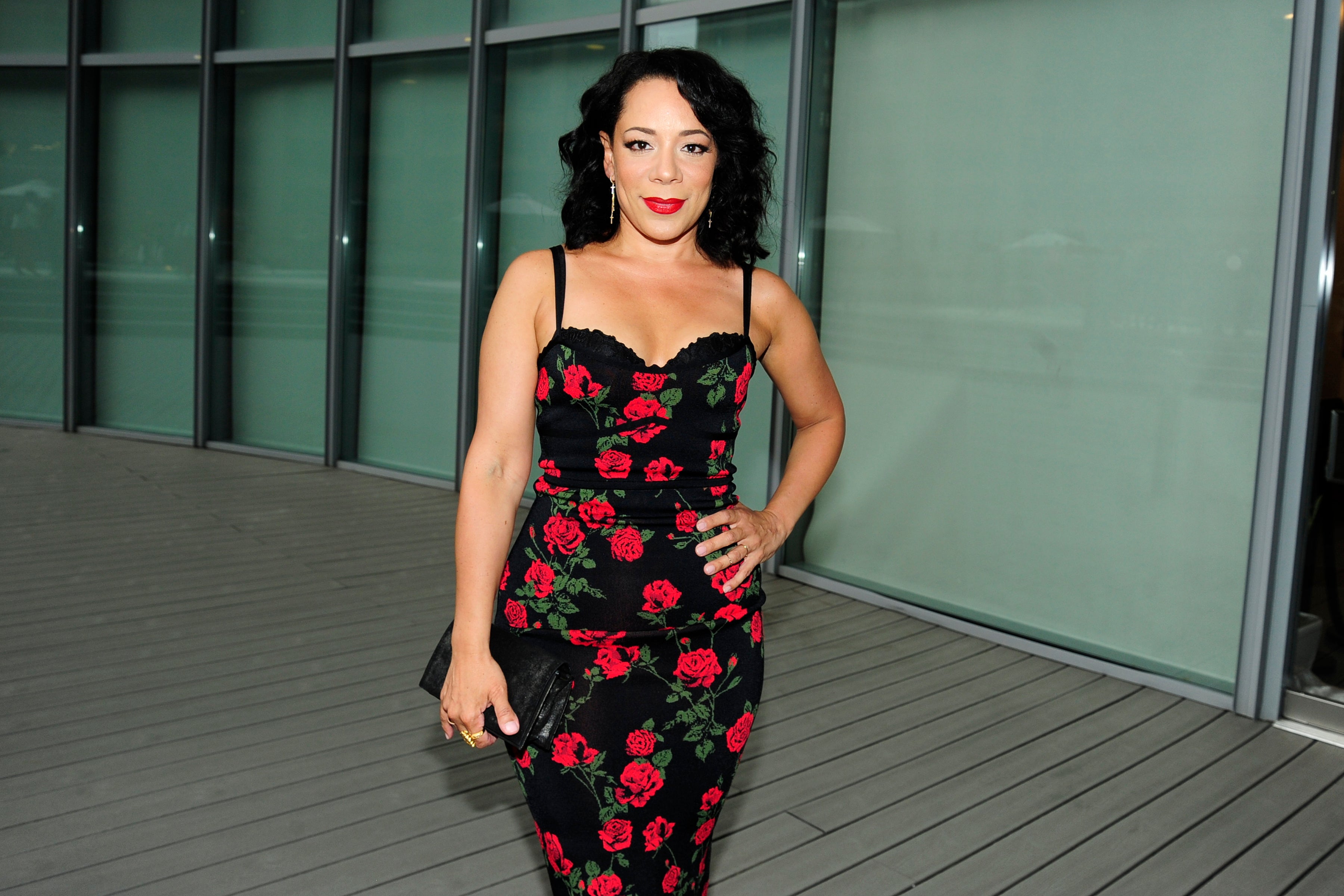
Selenis Leyva
A mother figure to many of the girls in Litchfield, specifically Dayanara “Daya” Diaz (Dascha Polanco), Leyva’s Gloria Mendoza is a character than exudes toughness but is much softer than she appears.
Throughout the series, we see Gloria struggle with her role as a leader, build a complicated relationship with Daya, and, in a storyline rarely seen on television, through Gloria, viewers witness what it’s like for a woman to go through menopause while incarcerated.
Season six wraps up with Gloria tossed in SHU (Security Housing Unit) after discovering that guards have been playing Fantasy Inmate, a game that sees guards collecting points for things they do to or have done to inmates.
Where Mendoza is in the final season:
“Something consistent with the development and the arc of Gloria Mendoza is that she’s a helper. She’s one of these people that is always putting herself in danger, even if that means risking her freedom. So we continue to see that, and more so than ever, stakes are heightened in season seven where she once again finds herself with the possibility of parole, and she makes a decision that really jeopardizes all of that. She’s so truthful to her heart and who she is as a person, that’s one of the things that I loved about playing Gloria. She could be really tough and show people one thing, but deep down, she’s something else. She’s a lot softer than people would think.”
“I am still waiting to see who is going to follow up on what was created on Orange Is the New Black. I haven’t seen that. Yes, are we seeing representation? Of course we are. But I think we’re seeing the same kind of representation with a sprinkle of new.”
Selenis Leyva
On Gloria getting a “fair” ending:
“She got exactly what she truly, truly deserves. I think that we, Jenji [Kohan] and the writers, just did really, really well by Gloria and I’m grateful. I’m grateful that the story was told honestly. There were times where, obviously, you wanted to go one way but when you think about the story as a whole it’s not just about one character, it’s about the entire story. So whatever makes the story as a whole feel right is exactly what happened here. And I think that with Gloria, I would say that I’m really satisfied with my journey with her.”
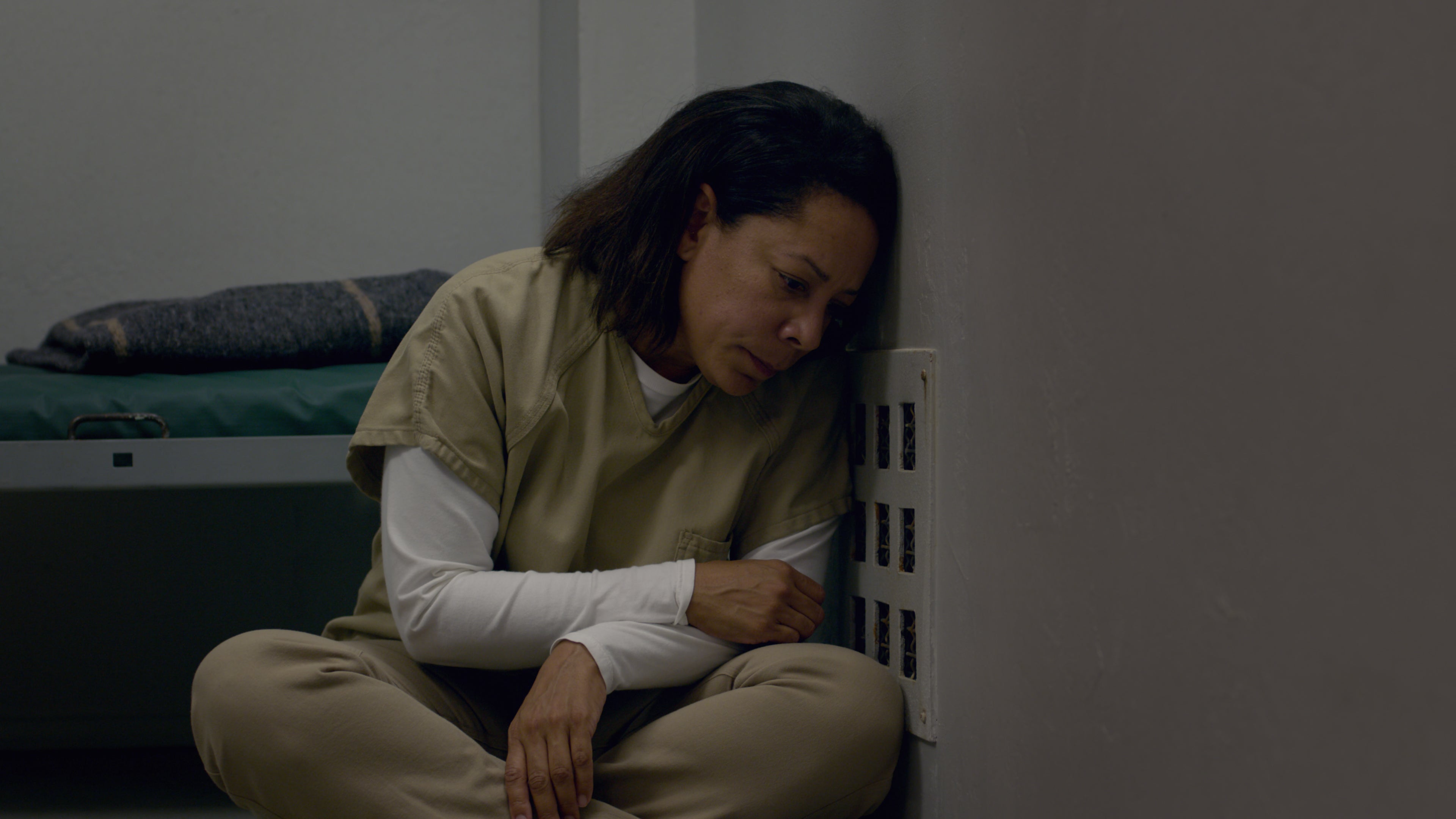
Wrapping Orange is the New Black:
“I put on Instagram a picture of myself, Dascha [Polanco] and Jackie Cruz, and that was the last day for myself and Jackie on set. And it was really great for us to be together, but it was tough. It was one of those days, we all walked in, we had been kind of like a mess already I think. We’re starting day one of season seven, we were all like, ‘Oh my God, can you believe this?’ There were many, many tears leading up to that moment so by the time we got there we also knew that we had to kind of put ourselves in a place of, ‘Okay, breathe. We have a job to do, and yes we are emotional, but our characters are not emotional, so let’s do our job.'”
“There was a strength about that for me that I was able to tap into, that when I was done with Orange, when we were all done with Orange, that’s when we all freaked out a little bit. There were group chats of support and lots of emojis, and everybody just missing each other, and realizing … even today, I realize that soon I’m going to go to New York and I’m going to see my little Orange family, and it’s going to be emotional. I’m already feeling it, because I don’t think that we will ever, ever have anything that comes remotely close to what we had on Orange.”
Who will follow in the show’s footsteps?
“One of the things I’ll remember most is that it was the first time that I felt that it was okay to look like me, and have people around me that were different. We were all just different, and all unique, and all beautiful, and all strong, and it was celebrated. We didn’t have to go on set and pretend to be anything other than what we are, women. Latina, Black, old, young, thin, tall, whatever. I think that there was a freedom in that, just something that you can’t even begin to understand unless you’ve been an actor for many, many years, and always being told that you are not enough. ‘You’re not enough of this, you’re not dark enough, tall enough, thin enough, light enough,’ whatever. So I think that for me, just knowing that I was part of the show that embraced difference the way it did, that’s such a gift. Such a gift.”
“[The industry] was so excited. Everybody was patting themselves on the back, even people that weren’t part of the show. For years, we’ve been talking about diversity, and these studios have all these diversity showcases and things like that, and they pick one out of each category, and then everybody feels like they’ve done their job. Where here, we were not just focusing on race, we were focusing on body types, on age. It was across the board. I am still waiting to see who is going to follow up on what was created on Orange Is the New Black. I haven’t seen that. Yes, are we seeing representation? Of course. But I think we’re seeing the same kind of representation with a sprinkle of new.”
“We are still really far away from tackling ageism. The different types of Latinas that exist in Hollywood. I’m an Afro-Latina, and a lot of people are like, ‘Wait, so you’re Black and White?’ I’m like, ‘No. I’m Afro-Latina, so that means I have African in me, I have Taino in me, I have Spaniard. There is a combination. We come in so many different shades.’ People have a hard time seeing my community, the Latinx community, other than a Salma Hayek type, a Sofia Vergara type. I’m still questioning whether people were paying attention enough to now take risks. I’m still going, ‘This is great, but now it’s over, so now what? Who’s next?’ I challenge someone to create a show that is this diverse, which is true diversity.”
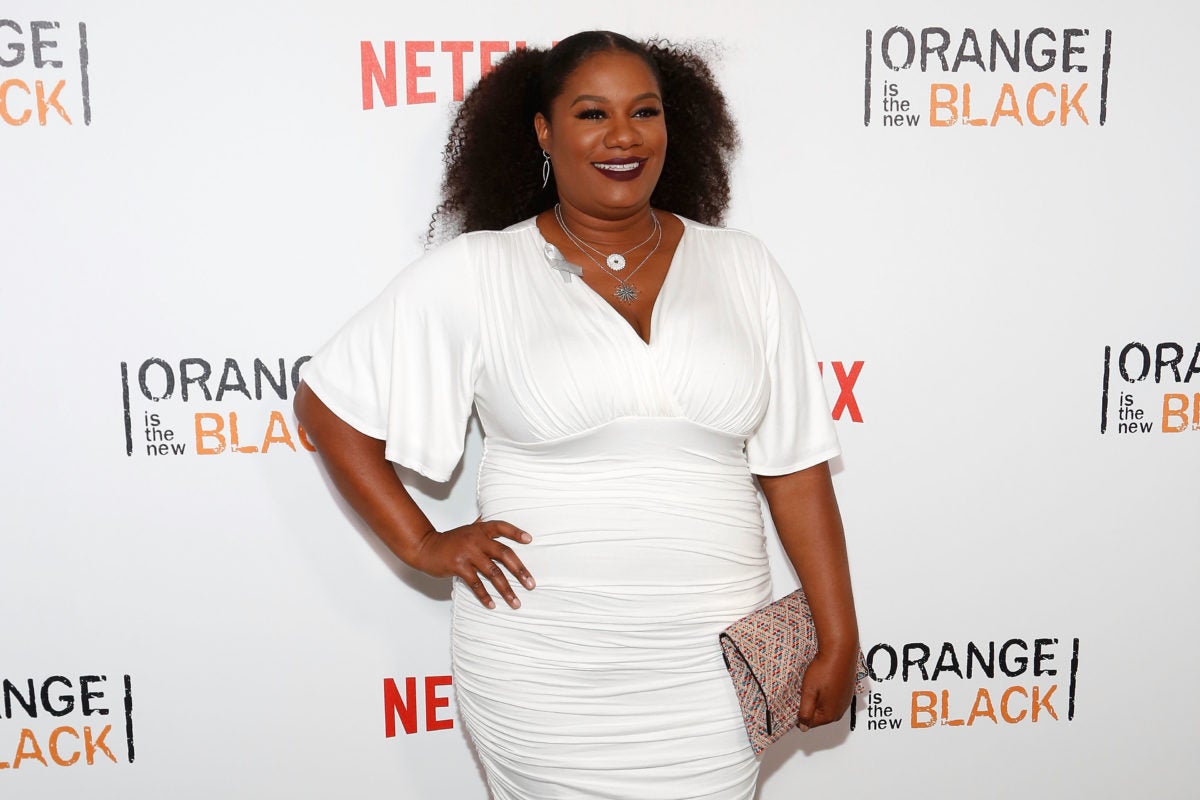
Adrienne C. Moore
Moore’s Cindy Hayes was also initially a source of laughter at Litchfield. A close friend of Brooks’s Taystee, the pair would often be seen throughout the series stirring up lighthearted fun and cracking jokes.
Eventually, we see more of who Cindy is as we get flashbacks of her past, including the revelation that Cindy has a daughter.
In season six, she later testifies against Taystee, grappling with the decision and struggling to forgive herself.
Cindy gets the perfect ending for her:
“I loved how her story ended. It is the perfect ellipses to a spin-off almost because I wanted at the end of her story for her to win. I think during the course of her journey you discover that she uses her humor to mask a lot of her pain, which does come out through the series. So by the end of it, I wanted to see a glimmer of hope for her. She was always painted as the girl who never grows up and never takes life seriously. And finally you see her, you experience her, taking responsibility and going back to where I think it began for her. She’s saying, ‘I’m not going to let anyone else tell my story or tell this story. I’m going to tell it.’ It was very powerful for me.”
How working on the series pushed her as an actor:
“I can’t remember which season it was but it was one of my first scenes with Kate Mulgrew and Natasha Lyonne, who are veterans of the business and I had been on the show for a while but this was [different]. A lot of people I worked with were new people like me, so we were all just kind of figuring it out and helping each other out. And then I found myself doing this scene with Kate and Natasha, who I’d always wanted to work with, and when it finally happenedI got suddenly scared and intimidated, like, ‘Oh my God, they’re going to sense I’m not a good actor!’ I was intimidated and I was flubbing my lines and I couldn’t look them in the eye and I was nervous and I was like, ‘Oh my goodness, what am I doing here?’ Finally, I just went, ‘No Adrienne, you deserve to be here as much as anyone.'”
“It was a scene where Kate, Natasha and I were in the bathroom and they were coming in to the black, the ghetto dorm bathroom to use it, because I think their bathroom had gotten flooded. I remember they were doing a close up and I just looked … I just mustered all the feminine masculine energy in me, and I delivered that monologue to Kate looking her dead in the eye. It was a close up shot of me. And after that scene, she gave me the biggest high five. And I was like, ‘Yes! I was accepted!’ I was like, ‘I am approved! Stamped, signed, sealed and delivered by Kate Mulgrew!'”
“It’s important to reflect on. I don’t think I would be an honest artist as if I wasn’t truthful about moments even when I get nervous and scared. And I’ve learned, if it doesn’t even scare you a little bit, then why are you even doing it?”
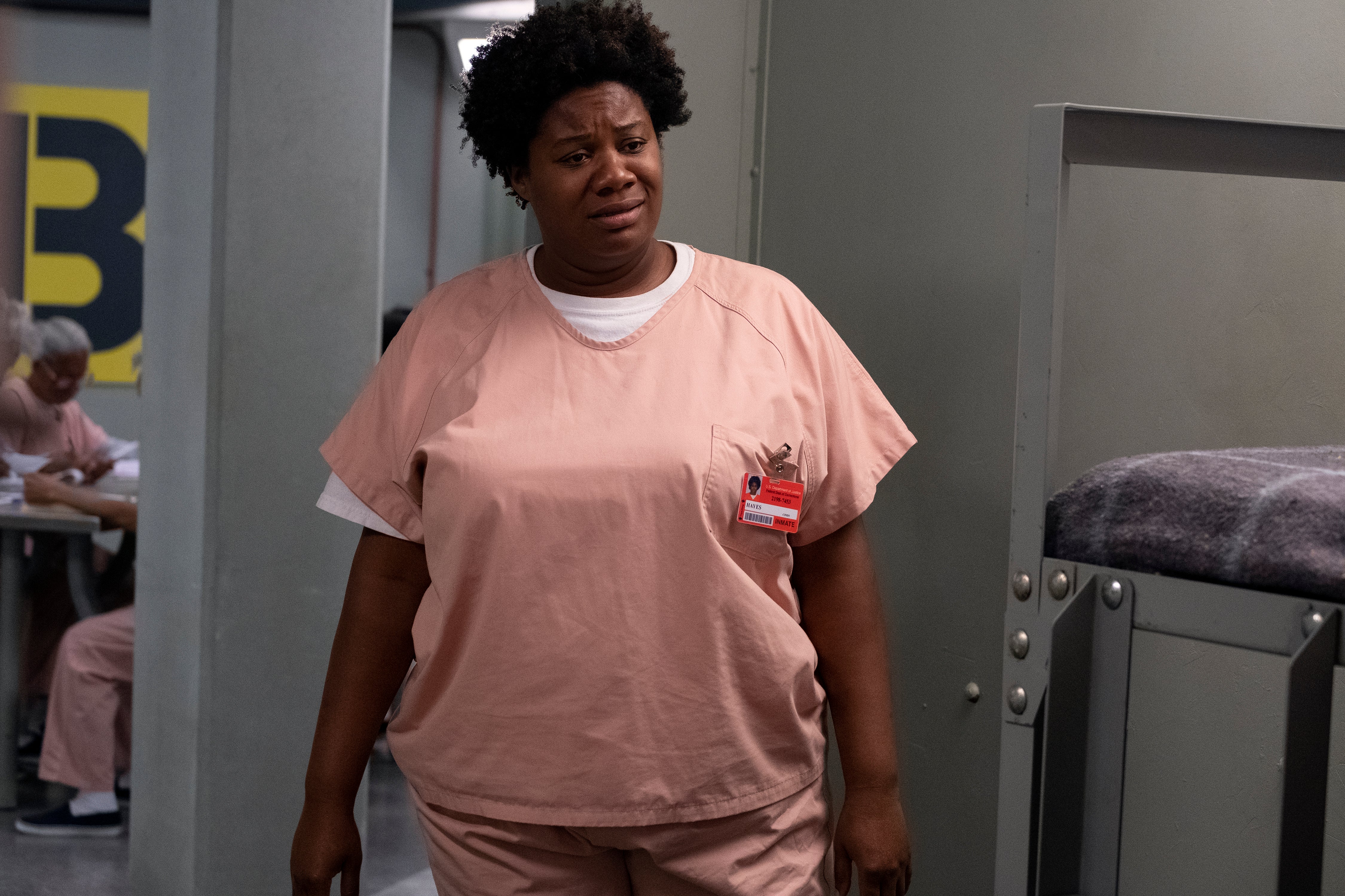
On how the series has made her consider prison reform:
“My agent just sent me a text the other day of an article of a prison in Scotland to show how this show is affecting people and even inmates all over the world.
“The inmates had all pretty much converted to Judaism to in order to receive kosher meals based on Cindy’s storyline. You could look at that and say, ‘Wow, Cindy turned people were kosher,’ but the bigger picture is, the bigger question is why. Looking at the prison system, what kind of meals are you serving that are causing people to do that?”
“Inmates because they aren’t viewed as people in our society, we don’t feel that they should be given the democratic rights that everyone else is given. Once you’re incarcerated you lose your right to vote, but you’re still a human and you still deserve to be treated as such. I hope we helped shape and, hopefully, change the conversation about how we view inmates, about how we treat people, about how we judge people, and that we can all be a little bit more humane in our world.”
The final season of Orange is the New Black premieres Friday, July 26 on Netflix.

